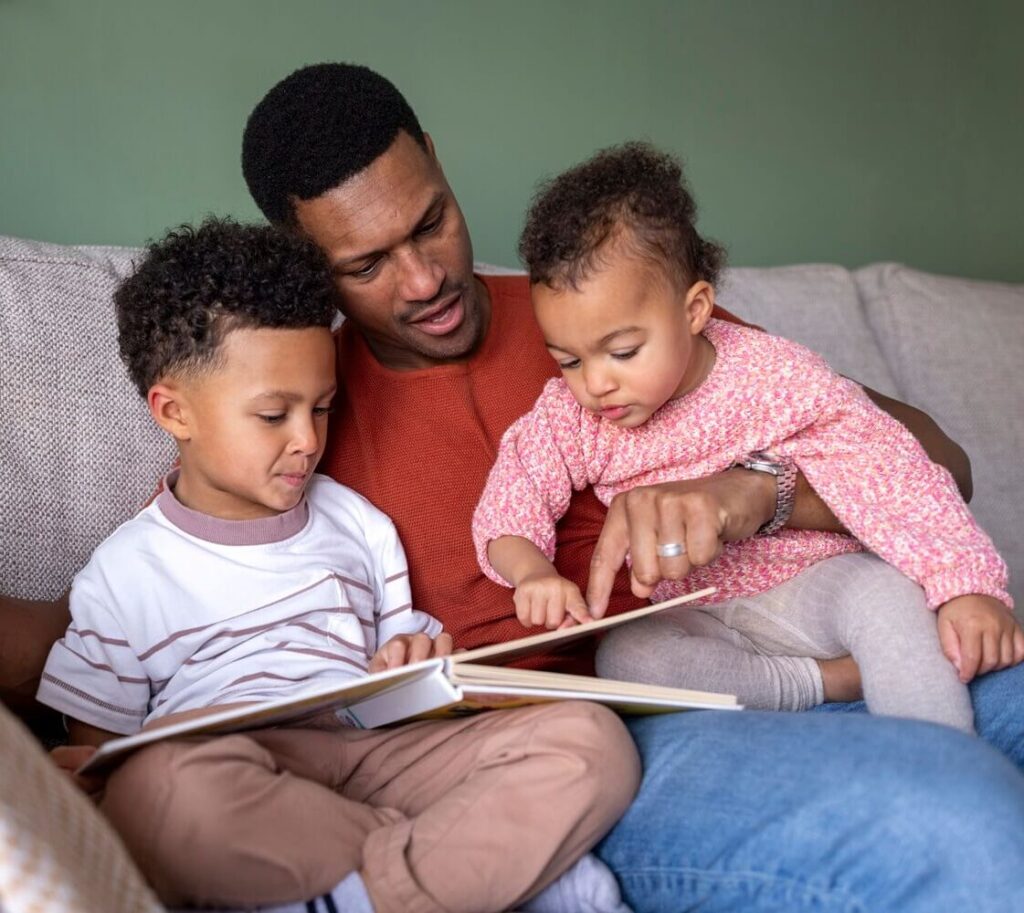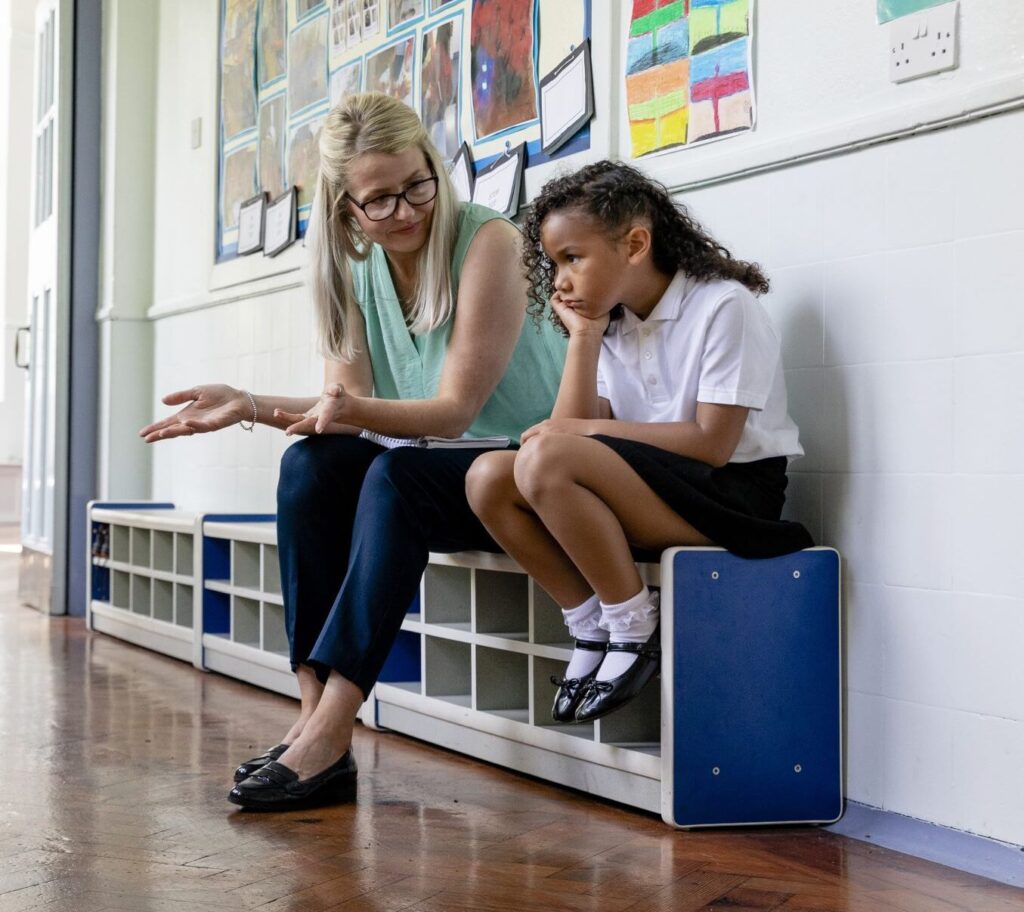Children are regularly exposed to a range of views about what Christmas should mean to them and what to expect. Television, playground conversations and even well-meaning family members can all set unrealistic expectations of what will happen over the festive period.
With a bit of planning, you can help to manage their expectations and ensure you have a family Christmas to remember, even if your budget and circumstances present challenges along the way.
Our services support people in a variety of ways, from the high-quality but low-cost food available at our FOOD clubs to parenting groups and mental health support across the country. Our service finder can help you find what’s available near you, or you can call our helpline, FamilyLine. In the meantime, here are some tips from our services to help you maintain household harmony this Christmas.
Decide as a family what’s important
There’s no doubt that Christmas can be an expensive time, but it’s also true that money is not what the real spirit of Christmas is about. It’s really all about the memories we create, so think about what the festive season represents for you as a family.
Have a conversation with your family in advance of the big day and get a sense of what are the best bits and what is less important, as well as sharing what you think is special about Christmas. This will help you spend your time and money in the most effective way.

Christmas food
You might feel pressure to follow Christmas traditions, but it’s important this works for your family and budget. And there are ways around this. For example, instead of buying a fresh turkey, you might choose a frozen one instead, which cost less.
Or you might talk to your family about Christmas food and discover no one actually likes turkey that much and would be happy with roast chicken instead – but they really love mince pies and wouldn’t want to miss out. Finding this out means you can make a tactical decision to streamline what you buy. Doing this helps you cut any costs that aren’t essential for your family, making Christmas dinner more manageable and keeping it within budget.
Christmas gifts
Having conversations about what’s important is also good advice where presents are concerned. And it’s an opportunity to have a chat about children’s lists for Father Christmas.
Focus on the things they’re really excited about, and avoid the temptation to buy everything. You could explain that Father Christmas has limited space on his sleigh, which means there isn’t space for lots of gifts for every child around the world. With older children, you might give a gift budget. Or you could have them pick presents that fit themes, such as something to wear, something to read and something to eat.
It’s easy to fall into the trap of thinking our children should have shiny new presents to open on Christmas day, but buying new is often much more expensive. Buying second hand, for example online or in charity shops, can take a lot of pressure off you.
Often you can pick up gifts which are still in their original boxes, but if not you can get gift boxes and bags to pop them in before the big day.
In the excitement of unwrapping presents, one of the least important things will be the box the present came in.
A note about Father Christmas
While many children are excited about Father Christmas, our services that work with trauma and special educational needs have highlighted that this isn’t true for all children. For some, the idea of a man coming into the house in the middle of the night can be worrying and unsettling.
Some families have found it often helps if parents or carers explain that they’ve spoken to Santa and asked him to knock on the door and let the grownups know he’s there when he visits their house.
Talk to your extended family and friends to set expectations
Sometimes after discussing Christmas with your children you might find they have expectations which you can’t meet. It might be that they want to spend time with their favourite aunts or cousins or hope that a grandparent makes a special cake or sweet treat they adore.
Share this with those people and discuss what you can do to fulfil those wishes. Perhaps you won’t be able to spend Christmas day together, but getting together a few days afterwards can be something lovely to look forward to.
This also allows you to open up the conversation about people bringing contributions to the key meals and events over the Christmas season. Many family members love bringing a signature dish, which is great as it’ll save you time, money and effort while helping them to feel included.

Your attention is the most important gift
Sometimes, our attention over the Christmas period can become distracted as we worry about the specifics of providing for our children. But what our children want most is the attention of their parent, and sometimes challenging behaviour is an attempt to get it.
Think about how you can make the day special simply by being present and taking an active interest in spending time with your children. One easy and low-cost option is to wrap up and head outdoors together for some fresh air. Alternatively, you could stay in and play games, or have an indoor picnic.
It doesn’t matter where you live – you can still find things to do outdoors to get rid of some of that pent up energy and stimulate their imaginations. Try have a walking conversation about what you can see, smell, feel and hear. Christmas itself offers lots of scope for activities, including looking at festive lights in your neighbourhood and planning scavenger hunts.
Don’t worry!
Ask any parent who has been doing it long enough and they will have made a mistake at Christmas – whether that’s forgetting a favourite Christmas treat their child had their heart set on, or buying the wrong gift.
It can be upsetting when tears are involved but nobody’s perfect, so remember to keep a sense of perspective. Not getting it quite right doesn’t make you a bad parent and it doesn’t ruin the day.
It’s a good idea to keep the receipts for gifts and toys in case something is faulty, but doing this also means you can exchange items if you accidentally bought the wrong thing. This can even work to your benefit, allowing you to make the most of January sales, and prolonging Christmas excitement.
Remember, you're not a bad parent if you don't get everything quite right at Christmas.
What you can do if you’re struggling
For families where money is tight, the idea of providing for their children at Christmas can be very stressful. The good news is that the season often brings out the best in people and there are ways you can access food hampers and toys if you’re struggling to make ends meet.
Many charities run toy appeals, like ours, which helps provide a gift for children or young people who might otherwise have nothing to open on Christmas day. Find out more about our Toy Appeal here.
Our FOOD clubs provide heavily discounted food to families across the country, and food banks are also available for those who need support to fill the cupboards at Christmas. These are usually linked to local churches, children’s centres and schools across the UK.
Whatever your Christmas looks like, we hope it’s special. But if you’re struggling, our FamilyLine service is a great resource for discussing the pressures that can arise when your trying to manage your children’s expectations at Christmas. You can get in touch via phone, text message, email or webchat for emotional and practical support and guidance.

Call, text, email or web chat FamilyLine
If you’re feeling overwhelmed, worried or upset about any aspect of your family life, FamilyLine is here for you. We offer free emotional support and guidance on family relationships, conflict, parenting, caring, financial worries and more.
Contact FamilyLine











